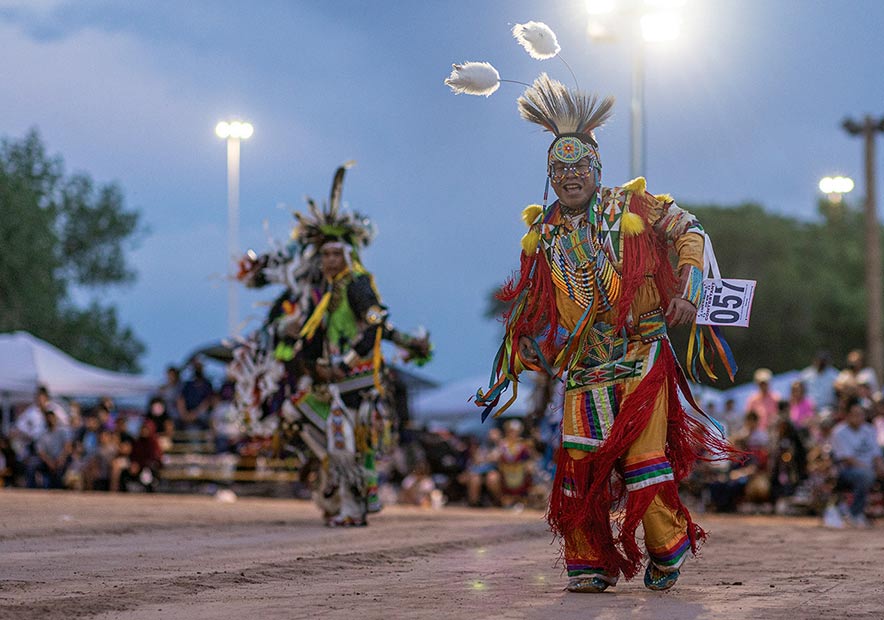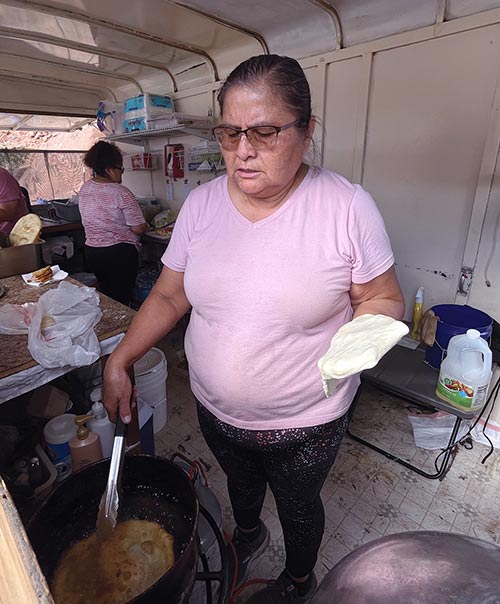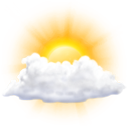
‘Backbone of America’: Powwow, gourd dance say ‘thank you’ to essential workers

Navajo Times | Sharon Chischilly
Dancers perform during the Path to Healing Gourd Dance and Competition Powwow in Church Rock, N.M., on Friday night.
CHURCH ROCK, N.M.
Standing in the middle of a cloud of frybread smoke is a true hero.
She stands about 5 feet, 3 inches tall and is a mom and a grandma – she also makes one mean frybread.
Her demeanor is a far cry from a stereotypical picture of what one might paint as a hero.
But her superhero powers come from her love for cooking, which she was doing at the “A Path to Healing” gourd dance and competition powwow.
Organizer Ryan Sandoval said the event was a small way to say “thank you” to essential workers, like grocery store employees, gas station clerks and health-care workers.
“They did a lot of sacrifices for their communities,” said Sandoval. “They knew that they were going to be exposed to Covid, but nonetheless they took the initiative to expose themselves and make sure that the community was supplied with essentials.”
It was because of their choice to get in harm’s way that he and the rest of the world were able to continue thriving and get food on the table, he added.
“The essential workers that get up every morning to go to work, work at the gas station, work at the supermarket, they are the backbone of America,” he said.
So, Sandoval and his committee got together and started a plan to thank them and health-care workers.
Sandoval did not know a cook and medical assistant were in attendance on Friday.
Standing at the stove

Navajo Times | Donovan Quintero
Nora J. Morris, a mother and a grandmother, flips a frybread with a pair of tongs as she stands at a burner stove on Friday during the Path to Healing Gourd Dance and Competition Powwow in Church Rock, N.M.
Nora J. Morris, the mother and grandmother, was standing at the hot stove on Friday, flipping one frybread with a pair of tongs and kneading a piece of dough in the other, inside the family food stand.
Her daughter and niece were taking orders from customers. The 90-plus degree weather did not seem to bother her as she made frybread after frybread.
It had not been this way for two years because of Covid. When the pandemic hit, Norris had to go from selling Navajo-style food to cooking to keep fed the 97-or-so To’Hajiilee Navajo elderly that lived in the community.
She is the supervisor at the To’Hajiilee Senior Center, she said.
In addition, Morris also wore the To’Hajiilee Chapter vice president hat, which arguably became her biggest hat as a public servant since March 2020 – she had to help ensure her community stayed safe, had to ensure residents adhered to the Covid safety protocols “Big Navajo’s” tribal department of health passed down, as well as planning for periodic community food gatherings, COVID-19 testing, and eventually a Covid vaccination event.
Her greatest test came when her family started contracting the highly contagious respiratory disease.
She said her family is mostly in the health-care field, so when they started getting sick, she cooked for them too, keeping them fed as they isolated.
Even when her mother, Catherine, 89, caught Covid. She’d go visit her at the hospital after she was done with work at the senior center and at the chapter.
“My mom, not knowing with her limited education, nobody there to translate for her – I’ll be sitting at the window crying,” Morris said. “I was so sad and I would tell my kids and my family, ‘I’m over here again. I’m over here with my mom.’
“And I would just try to do sign language from the window telling her to, ‘Cough, cough!’” she said.
Kate, medical superhero
Kate, a medical assistant, and arguably another superhero, who did not want to give her last name or where she worked because she is not authorized to speak on its behalf, shared her experiences as a front line health care worker.
For her, she said, it was helplessly watching Navajo elderly losing their lives to Covid.
“It still hurts to this day because we did lose a lot of people,” said Kate on Friday in Church Rock. “We did lose a lot of elders. We did lose a lot of traditions, a lot of values, a lot of culture – we lost all that.
“A lot of us, we didn’t know about the virus and how it affected the body,” she said. “We were just going in blind.
“It was very difficult, mentally, emotionally, physically,” she said. “It took a strain. I saw the strain on my coworkers.”
She also remembered the scare of having to reuse personal protective equipment in 2020. She was taken off the COVID-19 floor to “hunt” for PPE.
“We were down to using one N-95 per week,” she remembered. “Not only that, but face masks, gloves, too. It was very hard.”
When COVID-19 vaccine trials began, Kate said she volunteered.
“I said, ‘I’ll try it,’” she recalled.
A little over a month ago, Kate said she tested positive for COVID-19.
“I still have the persistent cough, I still have this phlegm, still deal with breathing problems,” she said, adding her husband also contracted the virus.
Despite the mental hardships, seeing people die due to the virus, and getting sick herself, she said she does not hesitate to choose to continue risking her life to save others, especially Navajo elderly.
“Sometimes I would just come home and say, ‘Creator, who else is going to do it? Just give me the strength to keep going,’” she said.
“I prayed every day. It was it was just awful to just see the exhaustion on health-care workers – even to now you could still see exhaustion,” said Kate.
Two years later
Two years later, Kate said she has learned to spend more time with loved ones, “and say, ‘I’m sorry, I love you. I forgive you.’ That’s what I’ve learned personally. That’s just me.”
Knowing what she knows and watching nurses retire or quit from physical and mental exhaustion, being overworked, Kate said she would not hesitate to get in harm’s way, once again, if another pandemic happened.
“Without a doubt, without a doubt, without a doubt – because who else is going to do it?” she said.
For Sandoval, a Marine Corps veteran, who’s always given back to the veterans, said seeing people come together, especially after two years of Covid, smiling and being happy, was gratifying.
Most of all, it was people like Nora J. Morris and Kate, who risked their well-being and health, that he could not be thankful enough for.
“I wish that I would say to each individual, ‘Thank you,’” Sandoval said.
“To do that, to be selfless, in a sense to put yourself in harm’s way, you got to have a lot of strength, a lot of sacrifice to do that, to sacrifice yourself, for your family, for your community, to put yourself in harm’s way, day and day out,” he said.
“This powwow and gourd dance is our way of showing how appreciative we are for what they did,” he said.
As a public service, the Navajo Times is making all coverage of the coronavirus pandemic fully available on its website. Please support the Times by subscribing.
How to protect yourself and others.
Why masks work. Which masks are best.
Resources for coronavirus assistance








 Highway 264,
Highway 264, I-40, WB @ Winslow
I-40, WB @ Winslow